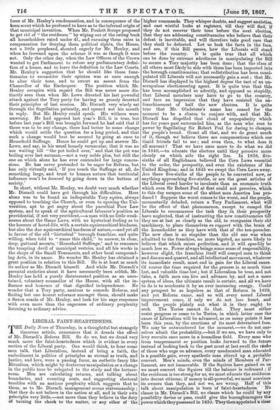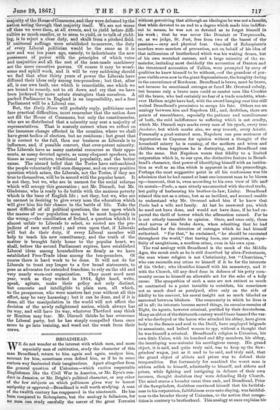LIBERAL FAINT-HEARTEDNESS.
THE Daily News of Thursday, in a thoughtful but strangely timorous article, announces that it dreads the effect of Mr. Disraeli's Reform Bill. So do we, but we dread very much more the faint-heartedness which is evident in every section of the Liberal party. One would think, to hear some men talk, that Liberalism, instead of being a faith, the embodiment in politics of principles as eternal as truth, and justice, and love, were a passing furor, an esthetic fancy like Ritualism, which might by dexterous manipulation or a change in the public tone be relegated to the study and the lecture- room. Men are calculating returns, and.- talking about boundaries, and counting seats, and suggesting electoral troubles with an anxious perplexity which suggests that to them, as to Mr. Disraeli, management seems statesmanship ; that they do not believe in the nation at all, and in their own principles very little,—not more than they believe in the duty of turning the cheek to the smiter, or any other of the higher commands. They whisper doubts, and suggest anxieties, and cast wistful looks at registers, till they will find, if they do not recover their tone before the next election, that they are addressing constituencies who believe that their defeat is inevitable, and will therefore take good care that they shall be defeated. Let us look the facts in the face, and see, if this Bill passes, how the Liberals will stand before the country. It is quite true that all which can be done by extreme adroitness in manipulating the Bill to secure a Tory majority has been done ; that the class of all others most likely to side with them has been imported into the borough constituencies; that redistribution has been mani- pulated till Liberals will not necessarily gain a seat ; that Mr. Disraeli has displayed in the highest degree the tact of an un- scrupulous electioneering agent. It is quite true that this has been accomplished so adroitly, and opposed so stupidly, that Liberal members may have to go to the country, and face an impression that they have resisted the en- franchisement of half the new eleetors. It is quite true that Mr. Gladstone's name has ceased for the moment to he a charm to conjure with, and that Mr. Disraeli has dispelled that cloud of unpopularity which has for years past surrounded him, as the man who rose to power by flagellating Sir Robert Peel for daring to cheapen the people's bread. Grant all that, and we do grant much of it, though we' believe there are compensations which our timid friends fail to see ; and even then, to what does it all amount ? That we have once more to do what we did in 1840,—to educate the electors until they perceive more clearly on which side the right lies. In 1838, five- sixths of all Englishmen believed the Corn Laws essential to the order, the prosperity, and even the existence of the United Kingdom; and in 1845 we swept the Corn Laws away. Are there five sixths of the people to be converted now, or anything approaching five sixths or are the great articles of the Liberal creed harder to inculcate than an economic truth which even Sir Robert Peel at first could not perceive, which to this day escapes some of the ablest men America has pro- duced ? Suppose the worst comes to the worst, and the people, momentarily deluded, return a Tory Parliament, what will be the effect of that phenomenon, except to compel the Liberals to recommence the task they in their prosperity have neglected, that of instructing the new constituencies till they see at last as clearly as the old, to reorganize their old machinery, to place themselves en rapport with the brain of the householder as they have withthat of the ten pounder The new class is no stupider than the old one was when admitted to the franchise, no more bigoted, no more likely to believe that which exists perfection, and it will speedily be much less so. Power always brings some sense of responsibility, however slight, the franchise itself will compel men to think and discuss and quarrel, and all intellectual movement, whatever its immediate result, must end in gain for the Liberal cause. Of course the time required for the process is SQ much time lost, and valuable time lost ; but if Liberalism be true, and not false, a faith men can live and advance by, and not a mere system of ideas, the ultimate result is certain, and_ all we have to do is to accelerate it by an ever increasing energy. Could any prospect be so hopeless as that of Reform in 1828, and yet Reform came, and BO will every, sound Liberal improvement come, if only we do not lose heart, and tell the people plainly out what it is they ought to seek. The Tories cannot do that. .Tfaey must either resist progress or cease to be Tories,- in which latter case the cause of Liberalism will be advanced, as; on many points it has been this year, by the exertions of its most determined foes. We may be outnumbered for the moment,—we do not our- selves admit the probability,—but if we are, we have only to levy recruits once more ill a boundless field. Every man who from temperament or position looks forward to the future instead of looking back to the past must at last swell the ranks of those who urge on advance, every uneducated man educated is a possible gain, every apathetic man stirred up a probable convert. Men's minds, even the minds of Members of Par- liament, are not immovable. If the Squires have gained on us we must convert the Squires till the balance is redressed ; if the residuum is too strong for us, we must educate the residuum into decent citizens; if money is all-powerful, we must convince its owners that they, and not we, are wrong. Half of this talk about manipulation is born of faint-heartedness. No clause in Mr. Disraeli's Bill, no clause which he could by any possibility devise or pass, could give the boroughmongers the power which theypossessed in 1830. They then appointed a clear
- majority of the House of Commons, and they were defeated bythe nation acting through that majority itself. We are not worse off than we were then, at all events, and to yield before diffi- culties so much smaller, or to seem to yield, or to talk of yield- ing, is to reject a clear duty, and skulk from a pitched field. • If universal suffrage were established to-morrow, the duty of every Liberal politician would be the same as it is now and was ten years ago, namely, to indoctrinate the new possessors of power with the principles of which votes and majorities and all the rest of the man-made machinery are the mere executive powers. Of course it may be weari- some and uphill work, and it will be very saddening should we find that after thirty years of power the Liberals have diffused their ideas only among ten-pounders ; but that, after all, is our own fault, one which is remediable, one which we are bound to remedy, not to sit down and cry that we have been jockeyed by more astute strategists than ourselves. A packed Parliament in England is an impossibility, and a free Parliament will be a Liberal one.
But, the Daily News will probably reply, politicians must face practical difficulties, must remember that the nation does not fill the House of Commons, but only the constituencies, who are so distributed that a minority may seat a majority of representatives. That is scarcely correct when we reflect on the immense change effected in the counties, where we shall have great bodies of electors, but no residuum ; but grant that it is correct to the full, then our business as Liberals is to influence, and, if possible convert, that over-potent minority. 'The Liberals have as many material resources as their oppo- nents, as many devoted agents, as many eloquent speakers, ten times as many writers, traditional popularity, and the better cause. The absurd belief that the Tories have enfranchised the people voluntarily will soon disappear, and on every positive question which arises, the Liberals, not the Tories, if they are true to themselves, will be in accord with the popular heart. It is not they, but we who are in earnest for the social reforms which will occupy this generation ; not Mr. Disraeli, but Mr. Gladstone, who is ready to do battle with the anxious poverty which is the bane of English life, not they, but we who are in earnest in desiring to give every man the education which will give him his fair chance in the battle of life. Take the most difficult of all political questions, the one upon which the masses of our population seem to be most hopelessly in the wrong,—the conciliation of Ireland, a question which it is almost unfair to Liberals to select, so rooted are the pre- judices of race and creed ; and even upon that, if Liberals will but do their duty, if every Liberal member will help to teach his new constituency, and the truth of the matter is brought fairly home to the popular heart, we shall, before the second Parliament expires, have established Liberal ideas among householders as firmly as we have established Free-Trade ideas among the ten-pounders. Of course there is hard work to be done. It will not do for Liberals to trust any longer to a few broad statements, to pose as advocates for extended franchise, to rely on the old and very nearly worn-out organization. They must work next year, work as they worked in 1844, fight hard, write, speak, agitate, make their policy not only distinct, but concrete and intelligible to plain men, all which, to the prosperous, who were masters last year without all this effort, may be very harassing ; but it can be done, and if it is done, all the manipulation in the world will not affect the decision of the newly enlightened nation, which always has its way, and will have its way, whatever Thetford may think or Honiton may fear. Mr. Disraeli thinks he has overcome the Liberal party, but he has simply compelled them once more to go into training, and weed out the weak from their crews.































 Previous page
Previous page